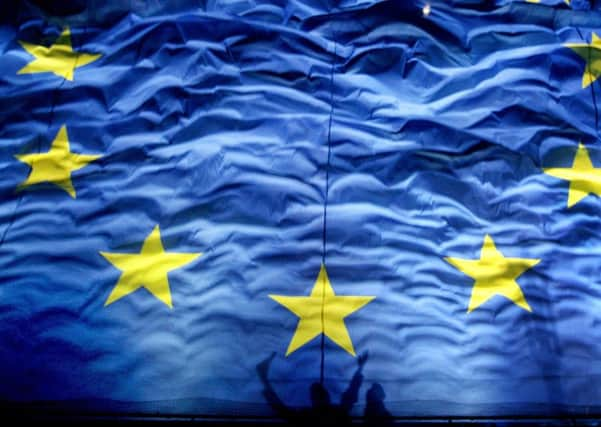Let's have a civilised debate on future of EU


Like me, he puts his name to his letters, and does not hide behind anonymity to be offensive.
I would like to pick up some points he makes.
NATO has been important for peace in Europe, but the original coal, iron and steel community, which became the Common Market in 1957, was specifically established to integrate the economies of countries which had fought on opposing sides in WW2 so that war between them would be unthinkable.
Advertisement
Hide AdAdvertisement
Hide AdI agree that we are currently in a very unstable phase of history, when we should be concentrating all our collective efforts on dealing with world economic uncertainty and the refugee crisis, and working to stabilise the Middle East: this is why we should NOT be causing still greater destabilisation by leaving the EU.
The way for MEPs to get EU legislation amended to our advantage is not to “fight tooth and nail to veto laws”, and frankly be offensive to colleagues as some of our UKIP MEPs do, but to work with other MEPs on the relevant committees to get support for amendments helpful to the UK, as I did during my five years in the European Parliament.
The advantage of the EU for addressing issues such as climate change is that it can pass environmental legislation binding on all 28 member states, while working with bodies like the United Nations which can advise but does not have powers to insist that advice is followed.
Mrs Thatcher’s government opted out of the Social Chapter safeguarding workers’ rights and social provision, and it was the last Labour Government that opted in.
Advertisement
Hide AdAdvertisement
Hide AdI shall be very surprised if those rights would survive our leaving the EU, with Scotland possibly then opting for independence, leaving England in danger of a permanent Tory right-wing majority which will certainly not be interested in furthering the interests of ordinary working people.
My experience of working with colleagues from other EU countries is that all want to retain their own distinct identities within the EU, while increasing cooperation to the maximum benefit of all.
The UK has actually been able to opt out of the single currency and Schengen, (open borders), both of which make travelling through Europe so much simpler for us Brits than it was in my youth.
Australia and New Zealand have built up trading partnerships with South-East Asia, which are much closer to them geographically.
Advertisement
Hide AdAdvertisement
Hide AdMany developing countries from the Commonwealth have been given preferential access for their products, such as bananas, to the European Market as a result of our joining the EU.
The majority of people in South Yorkshire did not vote for the present government, and our elected MPs get voted down. It’s called democracy.
However, in the European Parliament, where there is never a majority, MEPs can work with colleagues from different countries and political groups to amend legislation to benefit the widest number of people.
It is a different way of doing politics.
I hope I have demonstrated that the EU is not a monolithic top-down organisation.
Advertisement
Hide AdAdvertisement
Hide AdIn fact it is much more committed to the principle of subsidiarity – taking decisions at the appropriate level of government closest to the people – than our present government, which limits local councils as to how they must raise and spend their money far more than in any of the European countries I know well.
Finally, we should not forget the several million British citizens living, working or retired in other EU countries.
Apparently they are not to be asked their views, or be told what rights they would lose and how their lives might be adversely affected by the UK leaving the EU.
We now live in a global world, and are much better working together with our closest neighbours.
Veronica Hardstaff
Northfield Court, Sheffield, S10